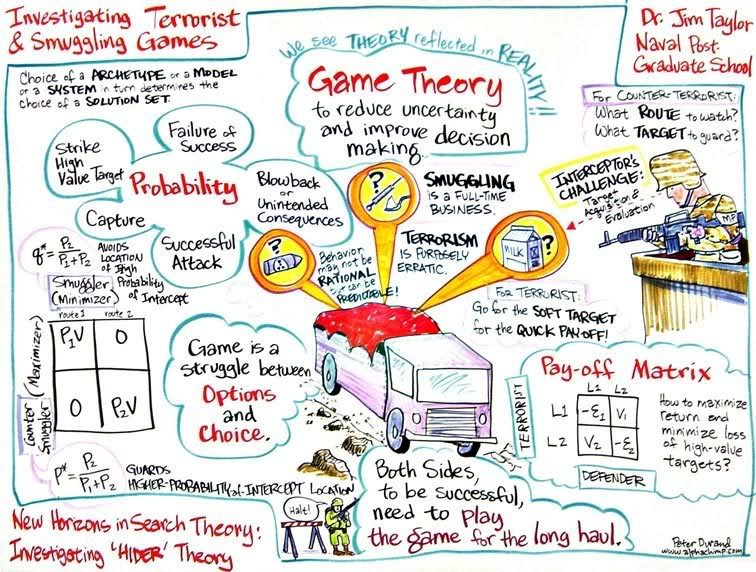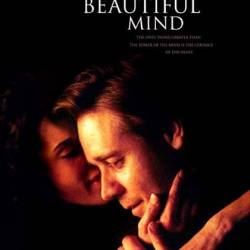Game Theory
- · Game
theory is a classic mathematical model of analyzing real world problems.
It was proposed by legendary mathematician Dr. John von Neumann.
 |
- · It
is one of the most important tools used by corporations, governments,
militaries and computer game designers these days for strategic decision
making in “real life” as well as real life-like situations.
- · Game
theory is called into play whenever there are several players whose
actions are interdependent.
- · It
is the genesis of revolutionary changes in economic theory, the study of
evolution and biology and has recently been applied in the automobile
industry as well. The fields of sociology and psychology also have
dedicated streams for creating datasets using game theory.
- · The
key aspects of game theory revolve around identification of process
participants, their various quantifiable options (choices), consideration
of their preferences and subsequent reactions. If all these factors are
carefully thought of, then the task of modeling the problem by game theory
along with identifications of all possible situations becomes easier.
- · Think
of coalition political parties tussling over power sharing in government.

· Cooperative Game Theory is often used
in politics and international relations because, invariably, power plays a big
role in determining the strength of a nation. The neoliberation in
international relations has greatly benefitted from game theory.
Brief History of Game Theory
- · The
mathematical theory of games was first developed by John von Neumann and
Oskar Morgenstern in the 1940s, but its applicability was limited to
parlor games.
- · John Nash, the subject of the 2001 Oscar-winning movie A Beautiful Mind transformed game theory into a more general tool that enabled the analysis of win-win and lose-lose scenarios, as well as win-lose situations. Nash enabled game theory to address a central question: should we compete or cooperate?


- · Game Theory remains at the cutting edge of economic theory, with game theorists winning the Noble Prize in Economics in 1994, 1996, 2005, 2007 and 2012. For his path-breaking dissertation that revolutionized economics and many other disciplines, John Nash won the Nobel in 1994, along with game theorists John Harsanyi and ReinhardSelten.
- · William Vickrey won the Noble in 1996 for his pioneering, work in incentives, asymmetric information, and auction theory, all crucial to the advance of effective strategy in a world of influence – like chess, football, military strategy and business.
- · Thomas Schelling and Robert Aumann won the 2005 Nobel for the game-theoretic work in conflict and cooperation, including contributions on credible commitments and repeated games. In the committee’s worlds, such contributions have made Game Theory “the dominant approach” to the analysis of conflict and cooperation.
- · Leonid Hurwicz, Eric Maskin and Roger Myerson won the 2007 Nobel prize for their work in mechanism design theory, a branch of game theory that extends the application of game theory to how different types of rules, or institutions, align individual incentives with overall social goals. Their work on allocation mechanisms has had a significant impact on the design of auctions, social welfare systems and many organizations.
- · Most recently, in 2012, the Nobel was awarded to Lloyd Shapley and Alvin Roth for their work using Game Theory for economic engineering. Both addressed how to match different agents as well as possible. Shapely used cooperative game theory to study and compare different matching methods. Roth built on Shapley’s theoretical work by showing empirically the conditions for the functioning of important markets in practice, and he demonstrated that stability is the key to understanding the success of particular market institutions.
- · Another form of Game Theory is the Coalitional model, where the payoffs of a group or coalition take precedence over individual player’s payoff. Assume a recently concluded election in which no individual political party has majority to form a government.
- · This model can actually analyse and find the best group or coalition so that the payoffs are maximized. This is different from co-operative model in the sense that here even a small individual political party can enjoy more power and influence than a larger party. The only thing that is never disclosed is the process of negotiations by which the individual players formed a group of coalition.
- · Many Public Relation agencies, marketing firms and direct selling firms use elements of Game Theory to narrow down their target consumer base. It improves their focus area by giving a relatively clearer picture of the methods that can be employed to deal with customers.
- · An international program run by the US secret service agencies known as “Prism” uses a software model based on Game Theory to ascertain predictability of terrorist activities, identities and their possible locations. The program gathers data from numerous sources such as international Internet gateways, satellites, social networking sites, emails, chats and messengers. The data is then fed into the program to create a spectrum of information about possible terrorist attacks in USA and elsewhere.
- · The Game Theory is criticized for being a limiting factor in expanding one’s vision and intuitiveness. Not to forget the fact that Game Theory largely bases its results in an isolated environment where only the players participating in the game are considered to be solely responsible for the outcome of the game. Evolutionary scientists and many physicists also claim that the Game Theory works largely against the basic principles of human and universal evolution. According to them, the existence of over billion living species of differing characteristics is a classic example which defies rationality at its best.
- · Criticism notwithstanding, the game theory is regarded as extremely useful by researchers in political science.
- · Useful
our useless, the debate continues as do developments in this field of
applied mathematics. This is also a fairly large group of supporters who
claim to have benefitted from Game Theory.
++++++++++++++++++++++++++++++++++++++++++++++++++++++++++++++++



